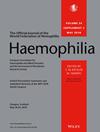Gap Analysis Investigating Healthcare Professionals’ Skills and Knowledge for Pain Management in Haemophilia—A Qualitative Study
Abstract
Introduction
People with haemophilia continue to experience pain impacting activities of daily living despite the advances in haemostatic treatments. Although guidelines exist, pain management in the clinical setting remains inadequate. It is unclear why this gap in practice persists. This study aimed to explore the practice and experience of pain management by haemophilia healthcare professionals (HCPs) to better understand perceived competency and barriers/facilitators to appropriate care.
Methods
European HCPs working ≥ 3 years in haemophilia care were invited to participate (haematologists, nurses, physiotherapists and psychosocial professionals). Data were collected using profession-specific focus groups and semi-structured individual interviews, recorded and transcribed. The data were analysed using reflexive thematic analysis.
Results
Twenty-three HCPs (6 haematologists, 7 nurses, 6 physiotherapists, 4 psychosocial professionals) from 10 European countries agreed to participate. Four themes were constructed: (1) Defining who is responsible: the challenges in multidisciplinary team provision for good pain management; (2) the concept of pain and its management exists in multiple temporalities; (3) aspirations for better pain management are limited by prevailing biomedicalism; (4) pain management can be better—knowledge and experience improves confidence.
Discussion
These data demonstrate a gap in confidence in the delivery of effective pain management, influenced by individual knowledge and skills and wider geographical determinants of healthcare delivery. There is a need for services to establish who is responsible for pain management and better understand professional role identity. Mechanisms to support the implementation of better pain care in haemophilia need to be explored.


 求助内容:
求助内容: 应助结果提醒方式:
应助结果提醒方式:


